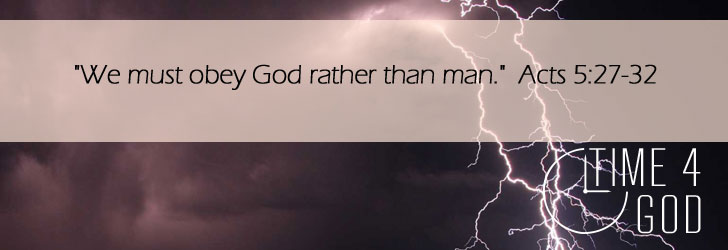We Must Obey God
This has been a common theme in the literature of the world from time immemorial.

This has been a common theme in the literature of the world from time immemorial. The ancient tragedian, Sophocles, wrote his play ʺAntigoneʺ around this very theme three centuries before Christ. Robert Bolt wrote ʺA Man for All Seasons,ʺ about a man named Thomas More, who was forced to make a similar choice in 16th century England. In both cases the powers of government were demanding obeisance to themselves, just as the High Priest and the Sanhedrin were demanding the Apostles’ submission in this passage, but Antigone, Thomas More, and the Apostles knew that, in matters concerning moral absolutes, there is a power that is far more worthy of their obedience than the powers of men. In faith, then, they each refused to bow to the demands of the human authorities. They chose, rather, to honor the higher laws of God. In each case, they paid the ultimate price for obeying God before man.
In John’s gospel, chapter 3, verse 36, we are challenged with this idea in another way: ʺWhoever believes in the Son has eternal life, but whoever disobeys the Son will not see life, but the wrath of God remains upon him.ʺ
[content-ad]
The passage from Acts reveals the reality that we face in this world where we are often put into situations that require us to make a choice between obeying the higher laws of God, or to submit to the laws of man in moral matters. Martin Luther King, Jr. gives an example of this choice in his civil rights struggles during the mid 20th century when state legislated Jim Crow laws enforced segregation and frustrated African American voting rights, one hundred years after the end of the Civil War, and the passage of the 13th, 14th, and 15th Amendments to the Constitution of the United States, which guaranteed citizenship and voting rights to those who had formerly been slaves. The civil and legislative powers in some of the states in the early to mid-20th century, manipulated the ʺstates rightsʺ clause of the 10th Amendment of the Constitution to create laws that treated some citizens differently than others, and forced immoral limits on some of The People, based soley on the unjust thinking of racial prejudices. Martin Luther King, Jr. and his compatriots from ecumenical religious supporters, to college students, and fellow Americans of every race, stood up courageously and non-violently before the political powers of the time, believing God’s laws to be higher than those of the states. They faced those who, used the power of the state, to enforce those unjust laws upon them with faith and with non-violent restraint. They honored God’s law and would not bend to those unjust laws of the state. And because they did, the nation was forced to look at itself and what it was doing to its own citizens. And America became a better nation because of those struggles.
Mother Teresa of Calcutta understood these things too, though in a more personally intimate and humbly simple way. She wrote:
ʺPeople are often unreasonable and self-centered. Forgive them anyway.
If you are kind, people may accuse you of ulterior motives. Be kind anyway.
If you are honest, people may cheat you. Be honest anyway.
If you find happiness, people may be jealous. Be happy anyway.
The good you do today may be forgotten tomorrow. Do good anyway.
Give the world the best you have and it may never be enough. Give your best anyway.
For you see, in the end, it is between you and God. It is never between you and ‘them’ anyway.ʺ
In each of these cases the message is the same: ʺWe must obey God rather than man,ʺ especially when it comes to the difficult moral questions and the often amoral behaviors of our times. It is not easy, but it is made easier with faith. We Christians know that God’s law is the supreme law, the law that we must obey, even if it means that the world may reject us, condemn us, or threaten us with harm. ʺWhat, then, shall we say in response to these things? If God is for us, who can be against us.ʺ (Romans 8:31) Amen.
SKM: below-content placeholderWhizzco for FHB

